11 Dec 2024

Tired Earth
By The Editorial Board

"While air quality has improved markedly over the past years, air pollution remains stubbornly high in many cities across Europe," said EEA executive director Hans Bruyninckx.
Although the coronavirus lockdowns introduced by almost all member states in the spring of 2020 led to significant reductions in air pollution, more than half of the 323 cities analysed by the EEA had a "bad" or "poor" air quality.
The analysis, released last week (17 June), shows that only 39 percent of the cities are categorised as "good" - meaning the level of long-term exposure to fine particulate matter (PM2.5) falls below the threshold established by the World Health Organization (WHO).
Fine particulate matter comes from emission sources like road transport, industrial processes or agriculture - being one of the air pollutants with the highest impact on health, leading to cardiovascular and respiratory diseases.
While the EU in 2015 set legally-binding air quality standards to tackle air pollution (a limit for PM2.5 of 25 μg/m3), they are less stringent than those suggested by the WHO (10 μg/m3).
Exposure to fine particulate matter caused about 417,000 premature deaths in 41 European countries in 2018 - 60,000 fewer than 10 years before.
It is estimated that reducing air pollution to WHO-recommended levels in the EU could prevent 51,213 premature deaths each year.
From 2019 to 2020, the top three cleanest cities in Europe in terms of air quality were Umeå in Sweden, Tampere in Finland and Funchal in Portugal.
Sweden's Uppsala and Stockholm, Estonia's Tallinn and Narva and Tartu, Noway's Bergen and Trondheim, and Spain's Salamanca also ranked among the top 10 of the EEA list.
By contrast, the three most polluted cities in Europe were Nowy Sacz in Poland, Cremona in Italy and Slavonski Brod in Croatia - all exceeding the limit EU's limits for air pollution.
Other Polish (Zgierz, Piotrkow Trybunalsi, Zory and Krakow) and Italian cities (Vicenza, Brescia and Pavia), as well as the town of Veliko in Bulgaria, also recorded the worst air quality in Europe.
There are currently 15 ongoing infringement procedures against member states for failing respect particulate matter limits at national level.
The European Court of Justice has ruled that Bulgaria, Poland, Romania, Italy and Hungary have all exceed the legal limits on air pollution, undermining human health.
But the European Commission has also referred France, Greece and Slovakia to the EU's top court over poor air quality.
Another seven cases are currently at the stage of a reasoned opinion or a letter of formal notice, which are the initial steps of an infringement procedure.
Only cities with a population of over 50,000 inhabitants, which have monitored air quality for a minimum of 75 percent of period, have been included in the EEA analysis.
In May, the EU Commission unveiled a plan to reduce pollution in air, water and soil to levels that are no longer harmful to human health and natural ecosystems by 2050 - when the EU also aims to become climate neutral.
Source : euobserver.com
Comment